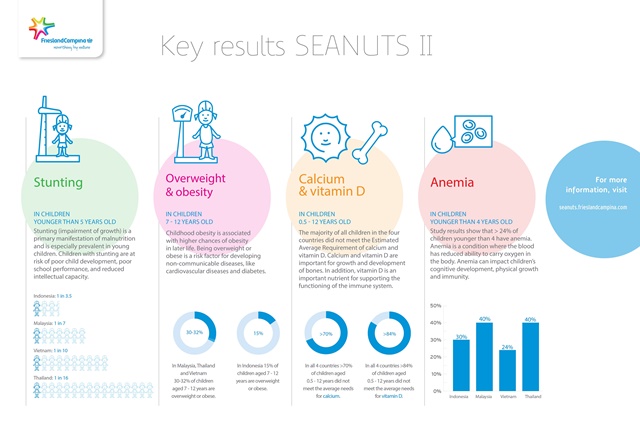Malnutrition is still a huge challenge among children in Southeast Asia
A recently completed study of nearly 14,000 children, aged six months to 12 years, highlights an important issue known as the ‘triple burden’ of malnutrition. This is the coexistence of undernutrition, micronutrient deficiencies and overweight/obesity. These three burdens often coexist in the same country and can even occur in the same family. The largescale study, commissioned by FrieslandCampina, was conducted between 2019 and 2021 by leading universities and research institutes in Indonesia, Malaysia, Thailand and Vietnam.
This new study follows the South East Asian Nutrition Surveys (SEANUTS I), which were presented in 2012. Overall, this second study (SEANUTS II) shows that stunting and anemia still exist, especially in younger children. However, for the older children, there is a higher prevalence of overweight and obesity. Also, most of the children do not meet the average needs of calcium and vitamin D intake and show vitamin D insufficiencies. This ‘triple burden’ makes it a matter of great importance to fill nutritional gaps with proper nutrition interventions and educational programmes.
Numbers show urgency of improving access to better nutrition
Commenting on the study’s findings, Dr. Nipa Rojroongwasinkul, Principal Investigator for SEANUTS II in Thailand and Senior Advisor of Institute of Nutrition, Mahidol University explains: “Healthy nutrition is about balance, moderation and variety. If children don’t get the nutrition they need, they won’t grow and develop properly. Our new study revealed that more than 70 per cent of the children in all four countries did not meet the average needs for calcium and more than 84 per cent did not meet the average vitamin D requirements. These numbers emphasise an urgent need to improve food security, as well as the availability of food products that meet the children’s needs, thus increasing access to healthy nutrition.”
Meanwhile the breakfast plays a vital role in a healthy daily diet. “Fortunately, majority of Thai children do not skip their breakfast. However, what we found is that not all breakfast eaters receive adequate daily energy, vitamins and minerals. Research has shown a relationship between the level of breakfast calories and the quality of daily diet. From this we could imply that starting the day off right with sufficient calories for breakfast could help improve health, growth and development of children in general.
Margrethe Jonkman, Global Director, Research & Development, FrieslandCampina, states: “Research is key to getting a better understanding of local nutritional needs. The results from this study will help FrieslandCampina in developing better and affordable products that meet the nutritional needs of children and in setting up programmes to promote a well-balanced diet and active lifestyle in collaboration with local authorities, health workers and schools.”
Whilst Mr. Vipas Paovarojkit, Managing Director of FrieslandCampina (Thailand) Public Company Limited says “SEANUTS II allowing us to recognize the current needs of Thai children across the country, which leading us to develop product and work with government parties to improve the nutritional status. In line with our mission to deliver an accessible better nutrition to all.
It’s striking to learn that majority of children these days didn’t meet the estimated average requirement of calcium and vitamin D. And almost half of children aged below four years old are suffering from anemia which can impact on cognitive development, physical growth, and immunity. Some of the above issues can be improved by providing a quality meal each day which contains vitamins and minerals. As one of the market leaders in food & beverages industry, we are aware of our role and responsibility to monitor and help public sector tackle national nutrition and dietary for our better future.”




